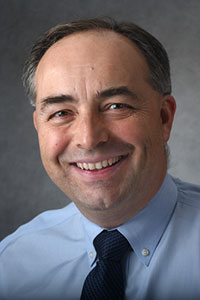Meeting
2017 Cancer Survivorship Symposium

Frank H. Netter MD School of Medicine, Quinnipiac University, Hamden, CT
Miklos C. Fogarasi , Gerald R Berg , Roy P Eichengreen
Background: Responding to calls for education in Cancer Survivorship, the Frank H. Netter MD School of Medicine introduced new content using an interactive student elective for Y2 medical students with the goal of improving medical knowledge and confidence in caring for survivors. Methods: Learning objectives and course content were developed based upon the ASCO curriculum (ASCO Core Curriculum for Cancer Survivorship Education Shapiro, CL et al, Journal of Oncology Practice Feb 2016 Vol. 12 (2) p 145-e117). Seven medical and one biomedical science student enrolled to complete the Sep-Dec 2016 course. Weekly sessions, facilitated by an Oncologist, utilize independent and collaborative learning, small group role playing, concept maps, algorithms and multiple case scenarios to identify and analyze key issues of survivorship. Co-facilitators with varied expertise and cancer survivors are invited weekly. Successful completion requires active participation, reading and discussion of required articles, contributing to a Glossary, and constructing a Survivorship Care Plan after independently interviewing a cancer survivor. A pre/post course questionnaire and reflective writing is used to assess change in knowledge and attitudes. Results: Weekly attendance was excellent, and students remained highly engaged. Sessions involving a geneticist, social worker, hospice nurse or APRN were well received. Students built a Glossary of cancer-terms, and practiced “Skills of the Week”. Pass/fail data and questionnaire data are pending, as the course is ongoing. Conclusions: Teaching cancer survivorship is feasible for Y2 students. Motivation and interest in the topic is high for this self-selected course. Based upon early observations and feedback the small group setting is valuable for interactions with survivors and inter-professional staff. Students recognize complex social factors influencing survivors’ care and combine knowledge from prior molecular biology, genetics, and physiology classes with the humanistic aspects of patient-centered care. If course evaluation data confirms its value, this curriculum may serve as one element of a multi-level graduate/post-graduate curriculum in Survivorship education.
Disclaimer
This material on this page is ©2024 American Society of Clinical Oncology, all rights reserved. Licensing available upon request. For more information, please contact licensing@asco.org
2017 Cancer Survivorship Symposium
Poster Session
Poster Session A: Care Coordination and Financial Implications, Communication, and Health Promotion
Care Coordination and Financial Implications,Communication,Health Promotion
Educational Curriculum
J Clin Oncol 35, 2017 (suppl 5S; abstr 15)
10.1200/JCO.2017.35.5_suppl.15
15
B7
Abstract Disclosures
2019 ASCO Annual Meeting
First Author: Hira Latif
2023 ASCO Quality Care Symposium
First Author: Alexandra G. Peluso
2022 ASCO Quality Care Symposium
First Author: Sarah A Birken
2023 ASCO Annual Meeting
First Author: Elizabeth Francis